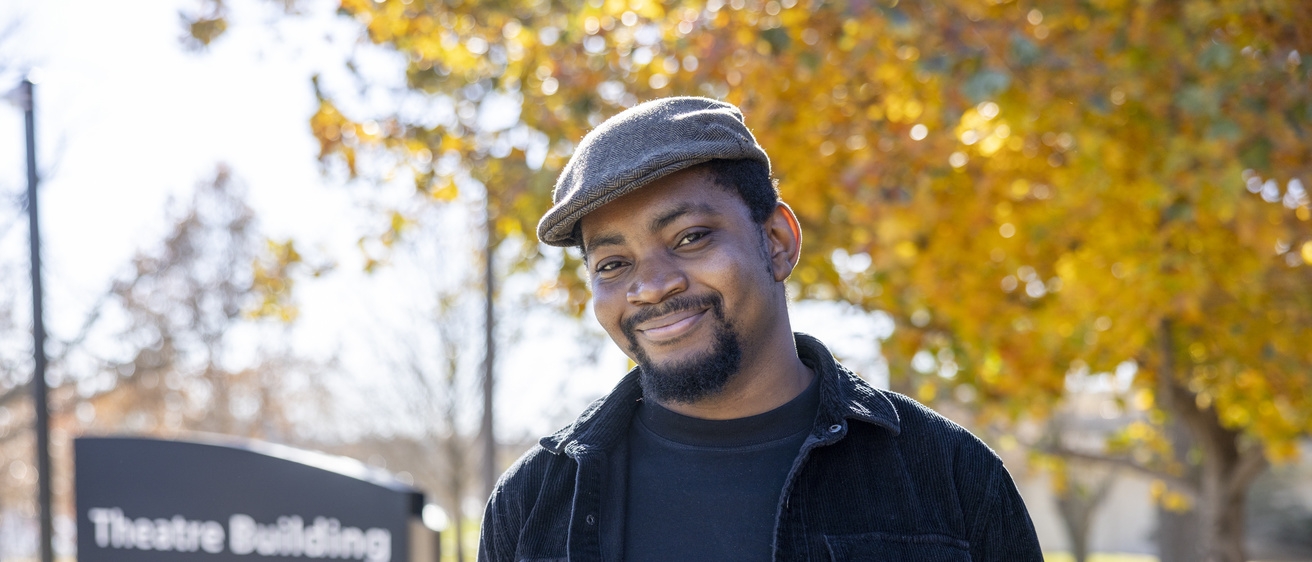“In search for other things, we find other things.” In October, at the public reading of his new play, No Gun Salute for Ofeke, Sixtus Chetachi “Cheta” Igbokwe, a second-year Theatre Arts MFA student in playwriting, introduced his project with these wise words from his late mother.
Igbokwe is an established author in his home country of Nigeria. He returned home this summer with support from the University of Iowa Graduate College’s 2023 Summer MFA Fellowship, where he conducted research and oversaw the production of his play, Awele, which premiered at The Arts Theatre of The University of Nigeria, Nsukka, under the direction of Ugochukwu Ugwu.
He also found his new story in Nigeria.
“Creativity, in my perspective, is born from the very forces of nature, like water and air,” Igbokwe discusses his development as a writer. “Through my artistic endeavors, I have become even more convinced that a storyteller is akin to a dibia. Just like a dibia mgborogwu, a healer, sets out to find a specific herb but discovers others along the way, my journey to Owerri last summer to research a story led me to begin weaving the tale of Ofeke.”
The new project explores themes of bargaining, blackmail, and manhood by playing with the dual meaning of Ofeke—a word that means both clown and a non-initiate of the masquerade cult.
“In the Igbo community, to be a full man, you must be admitted into a masquerade cult,” Igbokwe explains. “To be admitted, the cult must determine that you can keep the secrets of the mask. Ofeke is the story of a young man’s attempts and failures to gain admittance.”
Igbokwe is an alumnus of Chimamanda Adichie’s Purple Hibiscus Trust Creative Writing Workshop. He has written multiple poems and wrote the screenplay for Agwaetiti Obiuto (Island of Happiness)—a film described by Nigeria’s Nobel Laureate, Wole Soyinka, as a “magnificent work of art.”
Igbokwe’s first play, Homecoming, was the winner of the 2021 Association of Nigerian Authors (ANA) Prize for Drama. Homecoming is a story about misrecognition that follows Nwakibe and Adannaya Echeruo, a couple desperately searching for their long-lost son.
“My motivation for storytelling is mostly from personal experiences,” Igbokwe reveals as he tells the story behind Homecoming. “In 2019, I had a sister returning from outside the country after eleven years and I was the only family member in Lagos to receive her. I kept asking myself if I would really remember my sister. I felt if I didn’t recognize my own sister, I’d failed. So, I wrote a play about the burden of recognition.”
The play was first performed in spring of 2021 at The University of Nigeria, Nsukka, while Igbokwe was still a student there. Upon its success, the play was contracted for publication with Noirledge Publishing and was released December 2022. It was also selected as one of only eleven outstanding plays on the longlist for the 2023 Nigeria Prize for Literature—which is the largest and most prestigious literary prize in Africa.
Igbokwe’s work is rooted in his Igbo-African culture, and his love for stories and theatre come from his Nigerian upbringing. “I have always known how narratives are an integral part of our society,” he says.
Igbokwe grew up reading classics like Chinua Achebe’s Things Fall Apart and fell in love with the beautiful simplicity of Achebe’s language. It was, however, Chimamanda Adichie’s Purple Hibiscus that influenced the way Igbokwe engages with contemporary Nigerian culture. “In reading Adichie,” he says, “I discovered it was possible to write modern stories, stories set in this time—to have characters who are young and like me.”
At the University of Iowa, Igbokwe brings Adichie to his students. Alongside developing his own work, he teaches two undergraduate courses in playwriting. “We recently looked at Adichie’s ‘The Danger of a Single Story’—a speech about balance in storytelling.” Igbokwe pauses, laughing a little, and adds, “it’s actually what Adichie told me while I was at her workshop: Balance generates better conversations.”
Igbokwe decided to pursue an MFA in playwriting after receiving the Association of Nigerian Authors (ANA) Prize for Drama. Encouraged by Homecoming’s success, he set out to find a program that would give him the opportunity and time to create new plays. “I didn’t know about it before my search,” Igbokwe admits. But, after learning about the Iowa Playwrights Workshop, he was sold.
“The workshop gives you the opportunity to have people gather, hear your work, and give you the feedback you need. I’ve met a lot of talented writers,” Igbokwe says about his experience at Iowa.
“Every Monday, when we read the plays of my peers, it challenges me. The next day, I sit at my computer and tell myself to put in my best just as my peers have. This is what the workshop does, it encourages that sense of community.”
The Iowa Playwrights Workshop connects emerging writers with actors, directors, and other theatre practitioners in the Theatre Arts program so they can hear and see their productions on stage. The workshop offers abundant opportunities for playwrights to produce their work including weekly staged readings, smaller-scale Gallery Series productions, and the New Play Festival—an annual spring showcase of four fully-produced plays and numerous staged readings, all created by students in the workshop.
Igbokwe will be presenting his play, Brother-Brother, for the Gallery Series this semester. Brother-Brother is about an ill professor who returns to Nigeria to plan his own funeral. Upon his return, he reunites with his brother and together they fight the monster, Death.
“We call death Onwu. Onwu sounds tragic like a perpetual conclusion.” Reflecting on how the play conceives death, Igbokwe says, “I tell people I prefer to call death Nhapu, the Igbo word for transition.”
Cheta Igbokwe’s Brother-Brother is an original, engaging take on humanity’s age-old effort to grapple with the problem of death.

